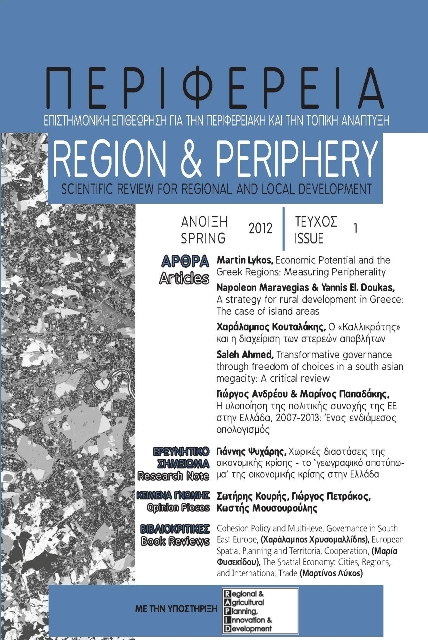Χωρικές διαστάσεις της οικονομικής κρίσης - το «γεωγραφικό αποτύπωμα» της οικονομικής κρίσης στην Ελλάδα

Abstract
Σκοπός αυτού του άρθρου είναι, με βάση εμπειρικά ευρήματα πρόσφατων μελετών, να κάνει μια επισκόπηση των χωρικών επιδράσεων της οικονομικής κρίσης στην Ελλάδα καθώς και των πολιτικών για την αντιμετώπισή της. Σύμφωνα με τα πρώτα ευρήματα των μελετών οι περιφερειακές ανισότητες στην Ελλάδα έχουν προ-κυκλικό χαρακτήρα. Το συμπέρασμα αυτό είναι σε συμφωνία με μεγάλο μέρος της επιστημονικής βιβλιογραφίας που εξετάζει τις περιφερειακές ανισότητες σε σχέση με τον οικονομικό κύκλο. Παράλληλα, η δημοσιονομική κρίση έχει οδηγήσει σε υποχώρηση της πολιτικής περιφερειακής ανάπτυξης καθώς μειώνονται οι δαπάνες δημοσίων επενδύσεων σε όλους σχεδόν τους νομούς και τις περιφέρειες της χώρας. Τo άρθρο καταλήγει με προτάσεις πολιτικής στο επίκεντρο των οποίων βρίσκεται η ανάπτυξη ‘περιφερειακού κεϋνσιανισμού’ με τη συνδρομή της Ευρωπαϊκής Ένωσης.
Article Details
- How to Cite
-
Ψυχάρης Γ. (2012). Χωρικές διαστάσεις της οικονομικής κρίσης - το «γεωγραφικό αποτύπωμα» της οικονομικής κρίσης στην Ελλάδα. Perifereia | Regional Integration: Politics, Economics, Governance, 1(1), 117–128. https://doi.org/10.12681/rp.18531
- Section
- Research Note

This work is licensed under a Creative Commons Attribution-NonCommercial 4.0 International License.
Authors who publish with this journal agree to the following terms:
· Authors retain copyright and grant the journal right of first publication with the work simultaneously licensed under a Creative Commons Attribution Non-Commercial License that allows others to share the work with an acknowledgement of the work's authorship and initial publication in this journal.
· Authors are able to enter into separate, additional contractual arrangements for the non-exclusive distribution of the journal's published version of the work (e.g. post it to an institutional repository or publish it in a book), with an acknowledgement of its initial publication in this journal.
· Authors are permitted and encouraged to post their work online (preferably in institutional repositories or on their website) prior to and during the submission process, as it can lead to productive exchanges, as well as earlier and greater citation of published work.


